NavSource Online: Submarine Photo Archive


Patch on left contributed by Mike Smolinski, Decal on right by unlimiteddetails.com
Please report any broken links or trouble you might come across to the Webmaster.
Please take a moment to let us know so that we can correct any problems and make your visit as enjoyable and as informative as possible.


| Click On Image For Full Size | Size | Image Description | Source | |
|---|---|---|---|---|
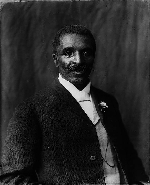 | 130k | George Washington Carver was born in 1864 on a plantation near Diamond, Mo. His parents were Negro slaves owned by Moses Carver. When he was only a few months old, he and his mother were stolen by raiders and taken to Arkansas. After the end of the Civil War, he was recovered by his owner with whose family he remained until he set out to make his own way in the world at about the age of 9. Overcoming prejudice and poverty, he eagerly seized every opportunity to acquire an education. He studied agricultural science at Iowa State College, graduating in 1894 and receiving a Master of Science degree 2 years later. After serving briefly on the faculty there, he joined Booker T. Washington at Tuskegee Normal and Industrial Institute, where he headed the Agricultural Department. In the ensuing years, his achievements in the fields of soil conservation, crop diversification, and utilization of southern plants and crops won him worldwide acclaim. He is remembered for the ingenuity which enabled him to discover some 300 new and useful products from the peanut, over 100 from the sweet potato, and about 60 from the pecan. He also found new uses from cotton, cowpeas and wild plums. He selflessly refused offers of fortunes for the commercial exploitation of his discoveries, choosing rather to give them freely to mankind. An indefatigable researcher and inventor, George Washington Carver died in Tuskegee, Ala., 5 January 1943. | Photo from the Library of Congress Prints and Photographs Division Washington, D.C. 20540, courtesy of Bill Gonyo. | |
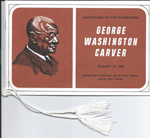 | 353k | Cover of the launching program of the George Washington Carver (SSBN-656) on 14 August 1965. | Photo courtesy of Dale Hargrave. | |
 | 895k | Overall scene of the launching ceremony for the George Washington Carver (SSBN-656) on 14 August 1965. The George Washington Carver was the last of 14 Polaris submarines built at Newport News Shipbuilding. | Photo courtesy of Dale Hargrave | |
 |
85k | Commemorative postal cover marking the launching of the George Washington Carver (SSBN-656), at the Newport News Shipbuilding & Dry Dock Company shipyard, Newport News, Virginia, on 14 August 1965. | Courtesy of Jack Treutle (of blessed memory). | |
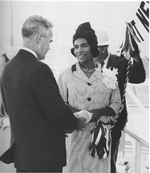 | 755k | Newport News Shipbuilding President Don Holden giving christening instructions to famed opera star Marian Anderson, sponsor of George Washington Carver (SSBN-656). | Photo courtesy of Dale Hargrave | |
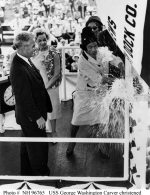 |
105k | George Washington Carver (SSBN-656), is christened by Marian Anderson, at the Newport News Shipbuilding & Dry Dock Company shipyard, Newport News, Virginia, on 14 August 1965. | USN photo # NH 96765, from the collections of the US Naval Historical Center. | |
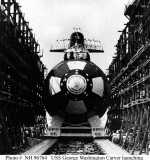 |
105k | George Washington Carver (SSBN-656) launching, at Newport News Shipbuilding & Dry Dock Co., Newport News, VA., 14 August 1965. | USN photo # NH 96764, from the collections of the US Naval Historical Center. | |
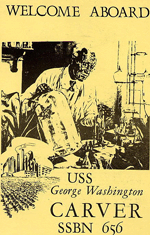 | 606k | Seven page PDF Welcome Aboard pamphlet for the George Washington Carver (SSBN-656). | USN photo courtesy of Scott Koen & ussnewyork.com | |
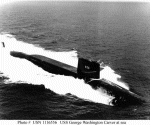 |
93k | George Washington Carver (SSBN-656), underway at sea, circa June 1966. | USN photo # USN 1116556, from the collections of the US Naval Historical Center. | |
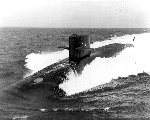 |
137k | The George Washington Carver (SSBN-656) appears here underway in the Atlantic Ocean, 13 July 1967. | USN photo courtesy of pelicanharborsubvets.com. | |
 |
537k | An HH-46A Sea Knight helicopter hovers over the nuclear-powered ballistic missile submarine George Washington Carver (SSBN-656) as it lowers a crewman on board, 1 September 1977. | Defense Visual Information Center photo # DN-ST-87-06227 by PH2 James Bishop, courtesy of dodmedia.osd.mil. | |
 |
512k | The air waves generated by a HH-46A Sea Knight helicopter cause the water to ripple as it hovers over the nuclear-powered ballistic missile submarine George Washington Carver (SSBN-656). | Defense Visual Information Center photo # DN-ST-87-06228 by PH2 James Bishop, courtesy of dodmedia.osd.mil. | |
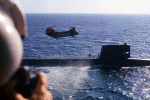 |
562k | The deck crew of the George Washington Carver (SSBN-656) gather in the lines as a HH-46A Sea Knight helicopter hovers over the nuclear-powered ballistic missile submarine. | Defense Visual Information Center photo # DN-ST-87-06229 by PH2 James Bishop, courtesy of dodmedia.osd.mil. | |
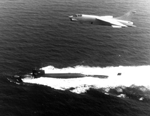 | 661k | The George Washington Carver (SSBN-656) underway in May, 1985 and being overflown by an RF-8G aircraft of VFP-806. | US Navy and Marine Corps Museum/Naval Aviation Museum, Photo No. 1996.253.7353.046 courtesy of Mike Green. | |
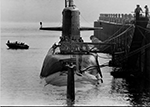 |
449k | 13 March 1992 press photo of George Washington Carver (SSBN-656), the 1st naval vessel to tie up to the new carrier pier. | Seattle Times photo courtesy of David Wright. | |
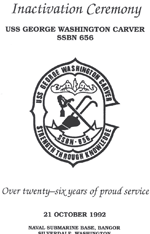 | 5.57k | Fifteen page PDF of the Inactivation Ceremony of the George Washington Carver (SSBN-656), 21 October 1992. | USN photo courtesy of Scott Koen & ussnewyork.com | |
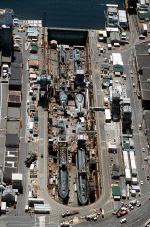 | 625k | An aerial view of four boomers in the early stages of being scrapped out in a graving dock at Puget Sound Naval Shipyard, Washington, 17 May 1993. Assuming the 17 May 1993 date is correct and based on recycling data in the June 1995 edition of Naval Proceedings, these are the likely submarines in the photo. Can�t tell which one is which. On the top port side most likely is the Alexander Hamilton (SSBN-617). The rest are Henry L. Stimson (SSBN-655), George Washington Carver (SSBN-656) & Will Rogers (SSBN-659). Alexander Hamilton recycling start date was 1 October 1992 & recycling end date was 28 February 1994. Henry L. Stimson start date was 2 November 1992, end date 28 February 1994. George Washington Carver start date was 2 November 1992, end date was 12 March 1994. Will Rogers start date was 2 November 1992, end date 12 August 1994. Other Comments: | Text I.d. courtesy of Darryl L. Baker. USN photo # DN-ST-95-01860 by Calvin Larsen, from the Department of Defense Still Media Collection, courtesy of dodmedia.osd.mil. |
|
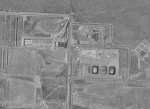 | 83k | Trench 94, Hanford Site, Washington, 1994. Hull sections containing defueled reactor compartments of decommissioned nuclear-powered submarines are put in disposal trenches. Once full, the trench will be filled with dirt and buried. The compartments are expected to retain their integrity for more than 600 years. | USN photo submitted by Jack Treutle (of blessed memory). | |
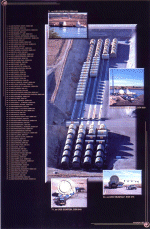 | 569k | Sealed reactor compartments are shipped by barge out of Puget Sound Naval Base down the coast and along the Columbia River to the port of Benton. There the radioactively-contaminated hull sections are transferred to special multiwheeled high-load trailers for transport to the Hanford Reservation in Washington State. Pictured below is the burial ground for spent fuel of the following 77 nuclear reactor submarines as of March 2003: Patrick Henry (SSBN-599), Snook (SSN-592), George Washington (SSBN-598), Scamp (SSN-588), Robert E. Lee (SSBN-601), Thomas Jefferson (SSBN-618), Theodore Roosevelt (SSBN-600), Dace (SSN-607), John Adams (SSBN-620), Abraham Lincoln (SSBN-602), Barb (SSN-596), Ethan Allen (SSBN-608), Thomas A. Edison (SSBN-610), Pollack (SSN-603), Glenard P. Lipscomb (SSN-685), James Monroe (SSBN-622), Skipjack (SS-585), Nathan Hale (SSBN-623), Plunger (SSN-595), Shark (SSN-591), Lafayette (SSBN-616), Sam Houston (SSBN-609), Jack (SSN-605), Haddo (SSN-604), Tinosa (SSN-606), Guardfish (SSN-612), Permit (SSN-594), Queenfish (SSN-651), Ulysses S. Grant (SSBN-631), John Marshall (SSBN-611), George C. Marshall (SSBN-654), Flasher (SSN-613), Guitarro (SSN-665), Alexander Hamilton (SSBN-617), George Washington Carver (SSBN-656), Tecumseh (SSBN-628), Halibut (SSGN-587), Will Rogers (SSBN-659), Henry L. Stimson (SSBN-655), Daniel Boone (SSBN-629), Greenling (SSN-614), John C. Calhoun (SSBN-630), Casimir Pulaski (SSBN-633), Skate (SSN-578), Sargo (SSN-583), Francis Scott Key (SSBN-657), Sturgeon (SSN-637), Benjamin Franklin (SSBN-640), Swordfish (SSN-579), Seadragon (SSN-584), Stonewall Jackson (SSBN-634), Simon Bolivar (SSBN-641), Hammerhead (SSN-663), Mariano G. Vallejo (SSBN-658), Tullibee (SSN-597), Lewis & Clark (SSBN-644), Pargo (SSN-650), Seahorse (SSN-669), Gurnard (SSN-662), Flying Fish (SSN-673), Gato (SSN-615), Puffer (SSN-652), Seawolf (SSN-575), Baton Rouge (SSN-689), Bergall (SSN-667), Whale (SSN-638), Henry Clay (SSBN-625), James Madison (SSBN-627), Finback (SSN-670), Spadefish (SSN-668), Sunfish (SSN-649), George Bancroft (SSBN-643), Grayling (SSN-646), Pintado (SSN-672), Tunny (SSN-682), Archerfish (SSN-678), & Woodrow Wilson (SSBN-624). As time passes & more boats are retired from service and their reactors are brought here, so the numbers rise. In this photo dated November 2009, 98 nuclear submarines and six nuclear cruisers have been recycled. For an up to date view, click here | USN photo submitted by Jack Treutle (of blessed memory). Insert link courtesy of wikimedia.org |
|
| Back To The Main Photo Index | Back To the Submarine Index |
|
Problems and site related matters, E-mail Webmaster |
|
This page created by Joseph M. Radigan (of blessed memory) and maintained by Michael Mohl All Pages � 1996 - 2025 NavSource History. All rights reserved. |